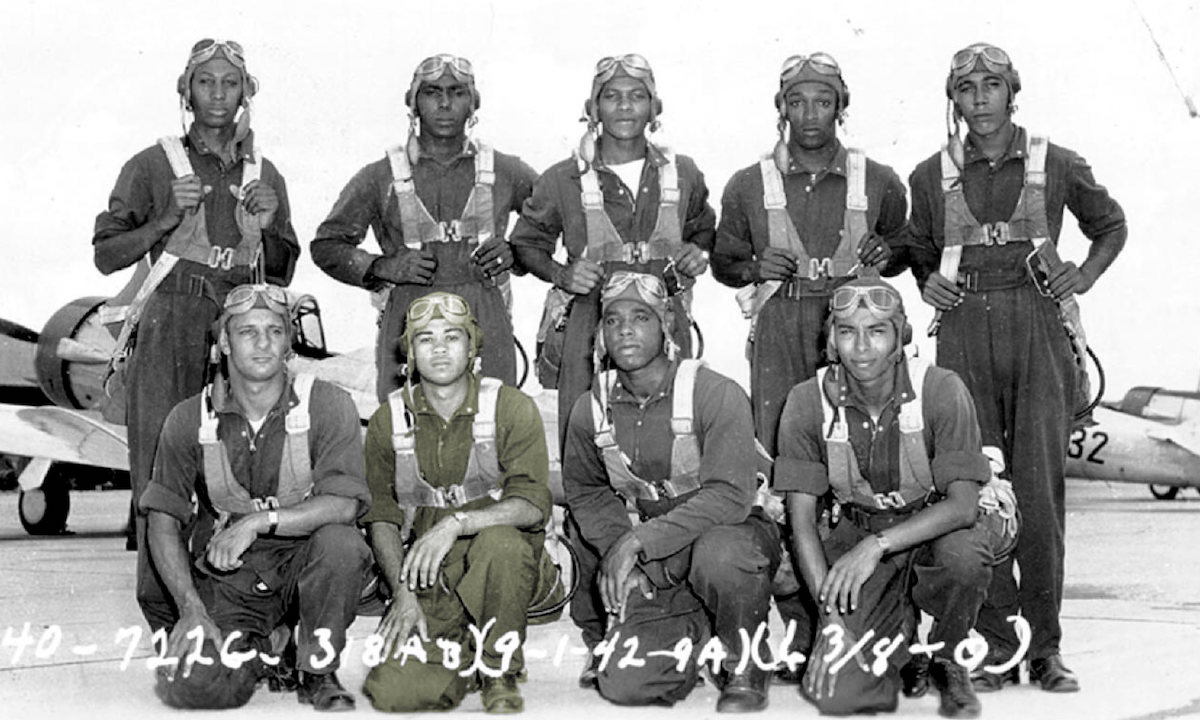|
Wilmore Leonard is pictured in front, second from left Photo Courtesy of the Charles H. Chipman Center Wilmore Brown Leonard was born December 30, 1916 to Katherine Brown Leonard and Howard E. Leonard, and was reared on Board Street, in Salisbury, Maryland. He graduated from Salisbury Colored High School. After high school, he entered and graduated from Hampton Institute, now Hampton University, in Hampton, Virginia, in 1939 with a bachelor’s degree in science. While at Hampton Institute, he was Captain of the Reserve Officers Training Corps (ROTC).
After graduating from Hampton Institute, Wilmore Leonard taught for two years at Accomack County High School in Parksley, Virginia. By 1941, World War II had begun and Leonard volunteered for the United States Army Air Corps in the fall of 1941 and was accepted in January of 1942. However, it was not easy for African American men to serve in the United States segregated military forces. At the time, they had to fight for the right to serve in other than menial jobs. However, due to protests against racism and segregation led by the black civilian workforce, black women’s groups, black college students, the National Association for the Advancement of Colored People (NAACP), and an interracial coalition that resisted inequality in the fighting forces, blacks were reluctantly allowed to enlist in the newly created United States Air Force. Despite opposition to the contrary, First Lady of the United States, Eleanor Roosevelt took a flight with one of the black pilots who became known as the Tuskegee Airmen. A combination of those groups and their protests combined with Mrs. Roosevelt’s bold stance helped to change some of the skepticism about the black pilots and their abilities to fly aircrafts. It was in January of 1941 that the United States War Department announced the formation of an all-black pursuit squadron of fighter planes and the creation of the training program at Tuskegee Army Air Field, Tuskegee, Alabama, for black pilots. White officers questioned the physical and mental ability of black men to serve or pilot fighter air craft. Unlike the rest of the Army, the 99th Squadron and the 332nd Group, which was made up of the 100th, 301st, and 302nd Squadrons had black officers. The all-black Army Air Command consisted of 400 enlisted men, 33 pilots and 27 airplanes. Those men were America’s first black military airmen, and most of them were high school and college graduates. Those Tuskegee Airmen performed well despite the racism and discrimination they experienced on a daily basis and gained an impressive record. They flew over 15,500 sorties and completed 1,598 missions in Africa, France, Italy, Poland, and Russia, escorting 200 heavy bombers deep into Germany. They accumulated 150 Distinguished Flying Crosses, a Legion of Merit, a Silver Star, 14 Bronze Stars, and 744 Air Medals. It was not easy because at first many American white pilots refused to associate with them until the French and other foreign pilots asked the Tuskegee Airmen to escort and defend them on missions due to their outstanding battle records. Wilmore Leonard volunteered in 1941 and graduated from Tuskegee’s Army Airfield School’s Single Engine Section in Class SE-42-H on September 6, 1942. On that date, he earned his wings, was commissioned a Second Lieutenant, and was the first African American from the Eastern Shore to do so. He was a member of the 6th cadet graduation class and was one of the first 50 African American combat fighter pilots in American history. His squadron was the first to join the 332nd Fighter Group. Leonard also joined the 99th Squadron, a part of the 332nd Fighter Group, known as the “Red Tails,” flew bomber escort missions for the 15th Air Force, attacked enemy positions in support of ground forces, and engaged in air combat. During his active military career, Wilmore Leonard was stationed at Tuskegee, Alabama; Oscoda, Michigan; Camp Kilmer, New Jersey; and Selfridge Field, Michigan. He and other black officers were often discriminated against and were not given the same accommodations and privileges as White officers. Leonard, the other Tuskegee Airmen, and African American soldiers fought the Double V: fought for victory in Europe during the war and also fought for democracy at home when they returned to the United States, even though they were treated better in Europe and Germany than at home. For his meritorious duty as a Tuskegee Airman, Wilmore B. Leonard was awarded seven Battle Stars. In 1945, he acted as the head of the Department of Technical Inspection for the United States Army and retired from active military duty in 1946 with the rank of Captain. However, after the war ended, Wilmore Leonard remained in the Army Reserves and obtained the rank of Major. In 1947, Wilmore Leonard applied for and was provisionally admitted to the University of Maryland’s graduate school for a postgraduate course in chemistry. However, the university refused to admit Leonard, an ex-Army decorated officer, on the grounds that the formal notice in writing of his acceptance as a student had been “a mistake.” An investigation revealed that in 1947 Leonard was offered provisional enrollment, supposedly due to poor grades compared to other applicants. Further investigation also revealed that when all applications had been received, Wilmore Leonard and at least six other black candidates who sought admission to the graduate school were denied admission. The records revealed that the president of the university rejected Leonard’s application for admission, but it was Edgar F. Long, the head of admissions at the University of Maryland, who travelled to Leonard’s home in Salisbury, Maryland in an effort to force Leonard to turn over the printed card that granted him provisional admittance to the university. Leonard refused to return the card, at which point Long told Leonard to keep it as a souvenir because his admission had been “a mistake.” Long then offered Leonard a scholarship for out-of-state study, possibly out of fear that Leonard would sue the university and/or seek media support for his cause. A September 27, 1947 Chicago Defender newspaper article related Leonard’s case and the fact that the college cited dissatisfaction with his previous average grades as a ruse for having denied him admission instead of stating that it was possibly due to Leonard’s race. The same scenario was also cited in a Baltimore Afro-American newspaper article, dated August 16, 1947. Upon rejection of his admission to the University of Maryland, in 1948 Wilmore Leonard enrolled in Howard University’s School of Dentistry and earned the Doctor of Dental Surgery in 1952. He taught as a professor of dentistry for 25 years at Howard University (HU) until he retired in May of 1976. During that period, he served as Howard University’s Associate Director of Clinics, and was also Secretary to the Faculty. He taught oral diagnosis, endodontics, oral therapeutics, and pharmacology. Howard University’s School of Dentistry awarded him the HU College of Dentistry Alumni Award for outstanding contributions to dental education. He was a member of the American Dental Association, the National Dental Association, the Robert T. Freeman Dental Society and the District of Columbia Dental Society. He also authored multiple journal articles on periodontology and endodontics. He officially retired from dentistry in May of 1977. Local and family lore has stated that Dr. Wilmore B. Leonard used the money that was given to him by Edgar F. Long, the head of admissions at the University of Maryland, to open and establish Leonard’s dental office in Washington, D.C. Dr. Leonard had a distinguished career as a dental surgeon and as one of the 1007 documented Tuskegee Airmen. Dr. Wilmore Brown Leonard, a beloved dentist, professor, Tuskegee Airman and Eastern Shore and Salisbury, Maryland native died at the age of 61 from cancer on April 2, 1978 at Howard University Hospital in Washington, D.C. NOTE: There are at least eleven (11) other Tuskegee Airmen known to have been born, reared, worked and lived on Delmarva. Dr. Clara Small Professor Emeritus at Salisbury University
0 Comments
Leave a Reply. |
Archives
July 2024
Categories |


 RSS Feed
RSS Feed
